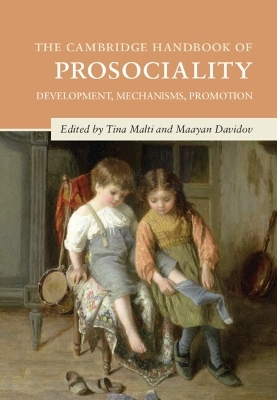
The Cambridge Handbook of Prosociality
Cambridge University Press (Verlag)
978-1-108-83471-1 (ISBN)
Prosociality is a multifaceted concept referring to the many ways in which individuals care about and benefit others. Human prosociality is foundational to social harmony, happiness, and peace; it is therefore essential to understand its underpinnings, development, and cultivation. This handbook provides a state-of-the-art, in-depth account of scientific, theoretical, and practical knowledge regarding prosociality and its development. Its thirty chapters, written by international researchers in the field, elucidate key issues, including: the development of prosociality across infancy, childhood, adolescence, and beyond; the biological, cognitive, emotional, and motivational mechanisms that underlie and influence prosociality; how different socialization agents and social contexts can affect children's prosociality; and intervention approaches aimed at cultivating prosociality in children and adolescents. This knowledge can benefit researchers, students, practitioners, and policy makers seeking to nurture socially responsible, caring youth.
Tina Malti is Professor of Psychology and Director of the Centre for Child Development, Mental Health, and Policy at the University of Toronto, Canada. She studies why certain children become aggressive while others show high levels of concern from a young age, and how to nurture wellbeing and ethical orientations in all children. She is co-editor of the Handbook of Child and Adolescent Aggression (2018) and president of the International Society for the Study of Behavioural Development. Maayan Davidov is Associate Professor in the Paul Baerwald School of Social Work and Social Welfare at The Hebrew University of Jerusalem, Israel. She received her PhD in Developmental Psychology from the University of Toronto, Canada. She pursues research on the development of empathy in the early years, different aspects of parenting and their contributions to children's functioning, and cultural influences on socialization.
Part I. Development of Prosociality: 1. Introduction: what is prosocial development? Definition, history, mechanisms Tina Malti and Maayan Davidov; 2. Developmental theories of prosociality Nancy Eisenberg and Tracy L. Spinrad; 3. The role of genetics in the development of prosocial behavior Ariel Knafo-Noam and Dana Katsoty; 4. Neurobiology of prosociality: investigating the link between empathy and prosocial behavior in the brain Claus Lamm and Paul A. G. Forbes; 5. The developmental psychophysiology of prosociality Paul D. Hastings, Ryan T. Hodge and Lindsey C. Partington; 6. Early prosociality from a developmental and comparative perspective Felix Warneken and Sarah Probst; 7. Prosocial behavior in infancy and early childhood Dale F. Hay; 8. Prosociality in middle childhood Richard A. Fabes and Stacy L. Morris; 9. Prosocial behaviors in adolescence Gustavo Carlo, Fiorella L. Carlos Chavez and Clara López-Mora; 10. Prosocial development across the lifespan Antonio Zuffiano, Emanuele Basili, Stefania Sette, Maria Gerbino, Concetta Pastorelli and Bernadette Paula Luengo Kanacri; Part II. Antecedents and Mechanisms of Prosociality: 11. The motives of prosocial behavior Joscha Kärtner; 12. Morality, values, and prosociality across development: intertwined yet distinct Audun Dahl and Marie Grace S. Martinez; 13. Emotions and prosociality Ross A. Thompson; 14. Social-cognitive development and early prosocial behavior Markus Paulus; 15. Temperament and prosocial behavior Deborah J. Laible, Afra E. Agalar, Clare Van Norden and Alysia Cruz; 16. Gender and prosocial development Jolien Van der Graaff; 17. Assessing prosociality: an early ontogeny perspective Robert Hepach; Part III. Development of Prosociality in Context: 18. Parenting and children's prosociality: multiple pathways to socialization Maayan Davidov and Joan E. Grusec; 19. Sibling influences upon prosociality: from infancy to adolescence Claire Hughes and Alison Pike; 20. Prosocial behavior, peer relationships, and friendships Kristina L. McDonald, Melanie A. Dirks, Kristen A. Dunfield and Estephen A. Hakim; 21. Explaining in-group bias and out-group bias in children's prosocial behavior: the role of group stereotypes Jellie Sierksma; 22. Prosocial behavior in school contexts Stuart I. Hammond, Robert P. Hill and Victoria L. L. Edwards; 23. Community and neighborhood influences on prosociality in children and youth Benjamin Edwards and Jacqueline Allen; 24. Culture and prosociality Tara Callaghan and John Corbit; 25. Prosocial media Laura M. Padilla-Walker, Hailey G. Holmgren, and Ryan D. McLean; Part IV. Applications: Nurturing Prosociality: 26. Fostering prosociality in the family context: a review of parent-and family-focused interventions promoting children's effortful control Qing Zhou, Aya Williams and Kaley Curtis; 27. Prosociality and civic engagement Laura Wray-Lake; 28. Prosocial behavior, positive youth development and character virtues: a dynamic, relational developmental systems-based model Richard M. Lerner, Jacqueline V. Lerner and Mary H. Buckingham; 29. Relational practices of care to nurture prosociality and advance policy Tina Malti and Ruth Speidel; 30. Toward a new era of prosociality research: priorities, challenges, and possibilities Maayan Davidov and Tina Malti.
| Erscheinungsdatum | 31.05.2023 |
|---|---|
| Reihe/Serie | Cambridge Handbooks in Psychology |
| Zusatzinfo | Worked examples or Exercises |
| Verlagsort | Cambridge |
| Sprache | englisch |
| Gewicht | 1421 g |
| Themenwelt | Geisteswissenschaften ► Psychologie ► Allgemeine Psychologie |
| Geisteswissenschaften ► Psychologie ► Entwicklungspsychologie | |
| Geisteswissenschaften ► Psychologie ► Verhaltenstherapie | |
| ISBN-10 | 1-108-83471-X / 110883471X |
| ISBN-13 | 978-1-108-83471-1 / 9781108834711 |
| Zustand | Neuware |
| Informationen gemäß Produktsicherheitsverordnung (GPSR) | |
| Haben Sie eine Frage zum Produkt? |
aus dem Bereich


